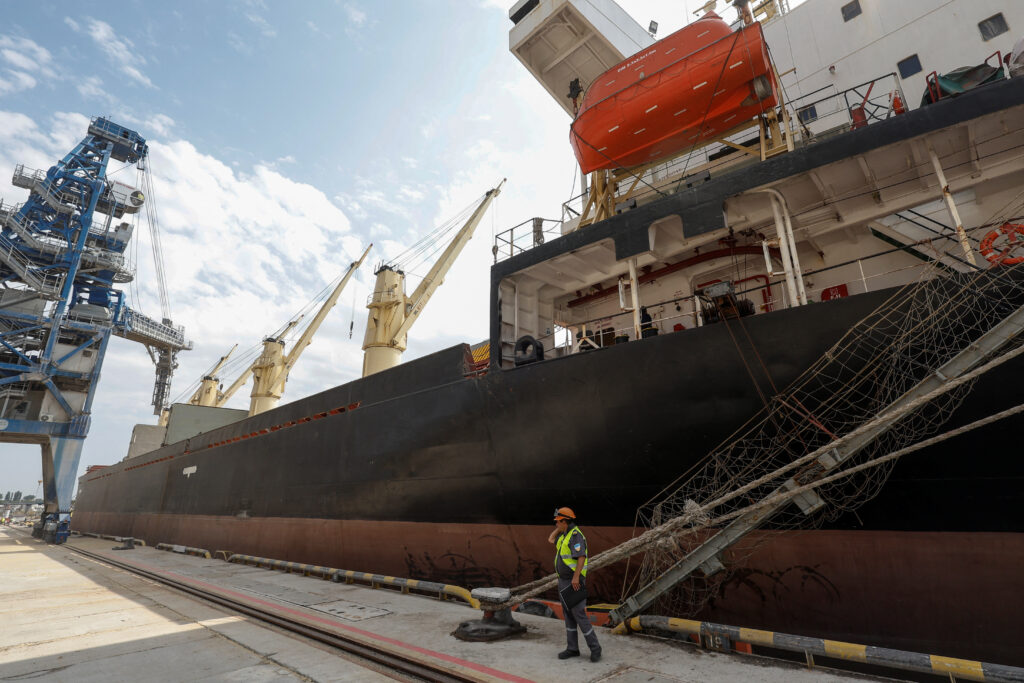The United Nations-chartered ship Brave Commander will depart Ukraine for Africa in coming days after it finishes loading more than 23,000 metric tonnes of wheat in the Ukrainian port of Pivdennyi, a U.N. official said.
The ship, which arrived in the port near Odesa, will sail to Ethiopia via a grain corridor through the Black Sea brokered by the United Nations and Turkey in late July.
It will be the first humanitarian food aid cargo bound for Africa since Russia’s invasion of Ukraine on Feb. 24. under the framework of the Black Sea Grain Initiative.
Denise Brown, UN Resident Coordinator in Ukraine, told reporters the grain was urgently needed in Ethiopia, and the United Nations would work to ensure continued shipments to countries around Africa that are facing famine and sharply higher food prices.
“On a very, very personal note, for any mothers who might be listening, seeing hunger in a child is very painful. Hunger, malnutrition is physically very, very painful,” Brown, who was previously posted in the Central African Republic, told reporters. “It’s up to all of us to help these children.”
The cargo was funded with donations from the United Nations World Food Programme, the U.S. Agency for International Development and several private donors.
“The world needs the food of Ukraine. This is the beginning of what we hope is normal operations for the hungry people of the world,” Marianne Ward, World Food Programme deputy country director, told reporters. The relief agency purchased more than 800,000 tonnes of grain in Ukraine last year.
Ukrainian authorities have not released details on when the Brave Commander will sail or when it will arrive in Ethiopia, citing security concerns.
A total of 16 ships have now departed from Ukraine, according to authorities there, following the deal with Russia to allow a resumption of grain exports from Ukraine’s Black Sea ports, after they were stalled for five months due to the war.
“We look at this … in a very positive way. We’re optimistic,” Brown told Reuters in a separate interview.
The agreement was reached last month amid fears that the loss of Ukrainian grain supplies would lead to severe food shortages and even outbreaks of famine in parts of the world.
The first ship to depart Ukraine under the deal, the Sierra Leone-flagged Razoni, was approaching the Syrian port of Tartous on Sunday, two shipping sources said. Read full story
Brown said the authorities were looking at using rail to augment the shipments of grain, and the Ukrainian agriculture ministry also plans to open a new truck route to Poland.
Ukraine has some 20 million tonnes of grain left over from last year’s crop, while this year’s wheat harvest is also estimated at 20 million tonnes.
So far most of the cargoes under the deal have carried grain for animal feed or for fuel.
As part of the U.N. deal, all ships are inspected in Istanbul by the Joint Coordination Centre, where Russia, Ukrainian, Turkish and U.N. personnel work.
Meanwhile, the first ship carrying Ukrainian wheat to be exported under the U.N.-brokered deal arrived in Istanbul on Sunday, the Joint Coordination Centre based in the Turkish city, said.
The Belize-flagged vessel is the first to carry wheat from Ukraine through the Black Sea since Russia’s invasion. The Sormovsky was loaded with 3,050 mt of wheat and had left Ukraine’s port of Chornomorsk on Friday.
Reuters footage showed the ship crossing the Bosphorus Strait and docking there, awaiting inspection.
It was the first shipment of wheat from Ukraine, which, along with Russia, accounted for nearly a third of global wheat exports before Feb. 24, when Moscow launched what it describes as a “special operation” to demilitarise its neighbour.
A total of 18 ships have now departed from Ukraine over the past two weeks, following the deal with Russia to allow a resumption of grain exports from Ukraine’s Black Sea ports, after they were stalled for five months due to the war.
The agreement, brokered by the United Nations along with Turkey, was reached last month amid fears that the loss of Ukrainian grain supplies would lead to severe food shortages and even outbreaks of famine in parts of the world.


